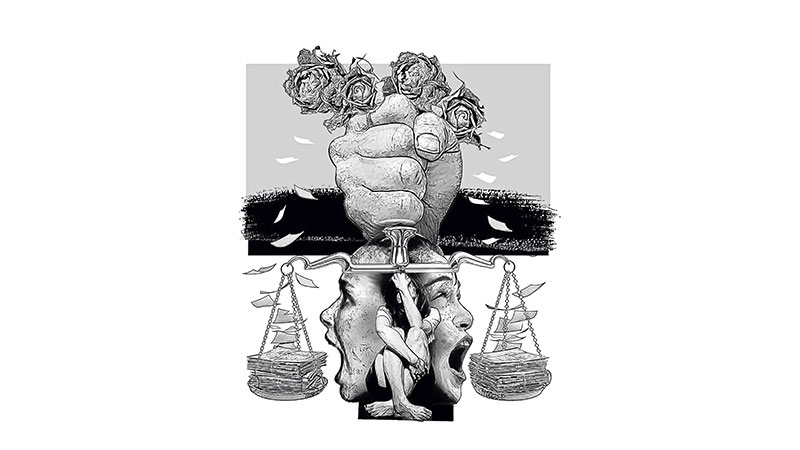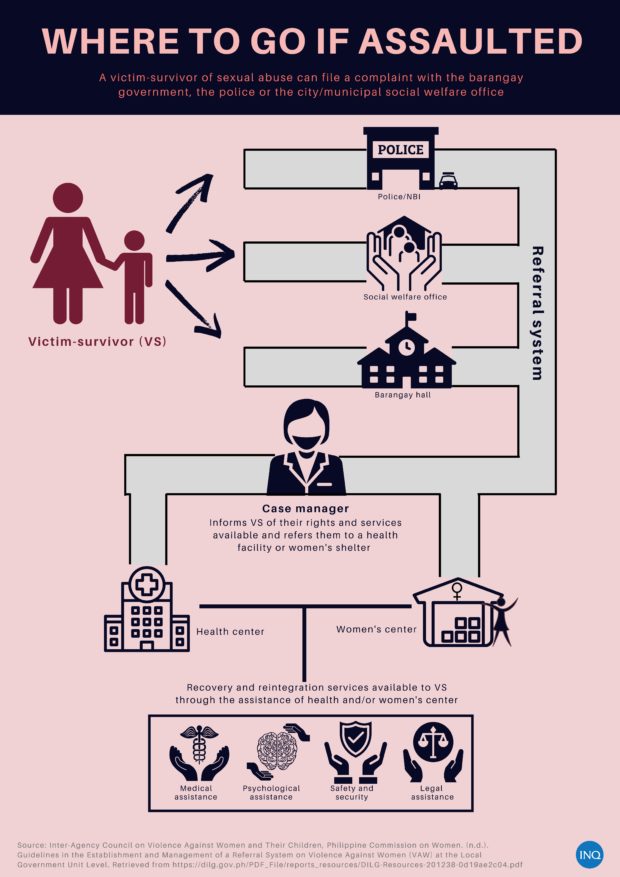
ILLUSTRATION BY RENE ELEVERA
(2nd of 3 sections)
“I saved questioning the validity of my tale,” suggests “Ana” as she narrates how she was assaulted past yr.
Through an night bash at a meeting held abroad, a man approached Ana and started hitting on her. “He was touching me without having my permission, but I was in a fantastic temper at that time so I imagined it was just fine,” she says.
They at some point agreed to have sex, and proceeded to her hotel room. Ana insisted on the use of a condom, but he stored “pushing even while I stated no.”
He managed to penetrate her without security, and at that second, Ana says, her mind shut off. “I recall pondering, ‘Why am I not indicating no proper now?’”
Right after the meeting, the male right away blocked Ana on social media, which manufactured her assume that potentially “he was regretting [what] we experienced in the occasion.”
It took her 9 months to understand that what happened was an assault: “I had wished to say no but I didn’t, and he just held going even nevertheless I reported no earlier on.”
The realization came after she watched Butch Dacanay’s “Jenny Li,” an on the net play that addresses the concern of rape and the courage it entails for victims to arrive forward, Ana states. But she “felt nothing” about the assault as she experienced begun to doubt that it was rape.
It was only at the top of #HijaAko—a social media movement on Twitter aiming to force again versus rape tradition in the country—and upon reading posts of her friends’ have stories of sexual abuse did it strike her: “That was what it was.”
She understood the problems of seeking lawful action towards her attacker. As a past resort, she posted her story on Twitter making use of #HijaAko.
The suggestions was instantaneous, Ana remembers: “My cellphone retained buzzing. People today had been messaging me, asking if I’m Ok. Some even arrived at out and explained to me the exact same issue occurred to them.’’
“At first it felt hefty,’’ she claims. “But then the psychological load was eased because of sharing that story and recognizing that other individuals carry the identical psychological load, that there is support from my pals. It assisted me.”
She managed to endure psychological remedy to system what happened, but remained “paranoid” and hesitant to explain to her family about the incident. “It is not a conversation I want to have [with them].”
For Ash Presto, a sociology instructor at the College of the Philippines (UP) Diliman, social media is useful in generating a local community of women supporting girls.
But for Malou Alcid, professor of social get the job done in the similar college, social media may well demonstrate quick and productive in launching strategies and recognition, but it caters to a certain viewers: the youth and the center- to higher-class.
“It simply cannot access older generations because they are normally not on social media,” she points out.
Sustained progress function
Alcid thinks it is a challenge for movements such as #HijaAko to be sustainable and provide a further understanding of a challenge for the reason that appreciation for the problem will be restricted to one particular-liners or a certain range of Twitter people.
What is nevertheless essential, she believes, is sustained improvement work that generates businesses that can “institutionalize the challenge.”
But Ana, who “grew up not trusting the systems” that are supposed to assist susceptible sectors, and who studied in a women-only college whose administration is “very oppressive” toward women of all ages and their rights, located ease and comfort in social media.
“I imagine social media actions like #HijaAko exist mainly because there is a thing innately completely wrong with what we have now,” she claims, underscoring the rapid reaction and help 1 can get in social media in comparison to the “slow bureaucratic process” of administrative methods.
She asks: “Is there a way to stability both equally?” 

Insensitivity
Government companies these kinds of as the Philippine Commission on Women and the Philippine Countrywide Law enforcement in coordination with area governing administration models actively aid target-survivors in some cases, according to Sen. Risa Hontiveros, chair of the Senate committee on females, kids and loved ones relations.
“But we nevertheless acquire studies of sufferer-survivors whose tales are at times dismissed by these institutions by themselves, or taken care of insensitively,” Hontiveros states, introducing:
“Therefore, it is not surprising that a lot of sufferer-survivors resort to contacting out their abusers on social media due to the fact often that’s the only room left the place some of them experience they keep some measure of empowerment and company, and can actually convey their outrage and get in touch with for justice.”
1 institution aimed at encouraging victim-survivors is the PNP Women of all ages and Youngsters Safety Heart (WCPC). It is mandated to defend girls and kids towards abuse and other gender-primarily based violence by conducting investigations and initiating necessary actions to assure the arrest and prompt prosecution of offenders.
When a person studies violence to the WCPC or the women’s desk at law enforcement stations, the first response is to conduct an preliminary overview of the incident and document it on the “pink blotter” special to these instances, Law enforcement Colonel Joy Tomboc, the WCPC main for Anti-Violence for Small children and Women’s Desk, tells the Inquirer.

The assessment will figure out the victim’s amount of chance and the proper help to be rendered, these kinds of as health and fitness treatment, psychosocial interventions and rehabilitation, by concerned governing administration and non-public companies.
Tomboc states the deficiency of services or shelters for victims, primarily of domestic abuse, is compensated by the quick issuance of temporary barangay defense orders to shield them from their attackers.
The wants of every sufferer fluctuate, and not every person will want to file a situation, Tomboc claims.
“Victims of abuse commonly have many factors when submitting a report,” she claims. “Some are beneath threat from their associates or are economically dependent on their husbands.”
A prevailing problem in filing a criticism or a case is receiving the sufferer to really file a person, states litigation attorney Alex Castro. 

“Most purchasers are not sure whether or not what occurred to them constitutes sexual abuse or harassment,” Castro says. Sometimes, she provides, fear of the offender’s retaliation holds again the victim-survivor, therefore perpetuating the culture of impunity.
In pursuing a situation, a sufferer has to file a criticism at the office of the city prosecutor, which will identify regardless of whether it has merit to commence to trial and the submitting of a legal scenario.
But Castro after encountered a prosecutor who employed a “skewed line of questioning”—he requested the target how substantially she experienced drunk on the night she professional sexual violence.
Stress of evidence
“That was quite harmful [to the client]. She was feeling suicidal due to the fact she assumed it was her fault,” Castro claims, introducing that it demonstrates how such thoughts have an affect on people trying to get justice.
Human rights attorney Kathy Panguban suggests there is a need to have to understand the stigma that victims of sexual abuse bear when it will come to the lawful procedure.
“Legally talking, that’s the mother nature of criminal circumstances. The burden of evidence is constantly on the 1 who alleges that a criminal offense has been dedicated from them,” she says.
But what is various with rape scenarios is that aside from proving the situation, “you also have to verify in the public’s eyes that you did not ask for it,” Panguban claims.
Psychological trauma surfaces in the target in the approach of fighting again, says Andrea Martinez, a psychology professor at UP Manila.
“Imagine this: You’ve been raped. Then when you are remaining interviewed, you have to prove that it is been completed to you, to the issue where by you have to relive the knowledge which you would relatively neglect,” Martinez claims. She claims this is why some pick out to be silent.
Martinez cites the situation of a youngster who was raped by her father for 6 a long time but the very first and last assaults were being the only scenarios that she remembered: “That’s also a manifestation of trauma she experienced overlooked [what happened] in among.” 

The youngest survivor Martinez has dealt with is a 2-12 months-previous who did not want to pass through the avenue exactly where her father, her attacker, lives. The rape was found out simply because the baby kept complaining of soreness in her anus she also experienced a urinary tract an infection and discharge at her tender age.
Other implications of sexual abuse are melancholy, drug dependancy, undesired being pregnant and sexually transmitted illnesses, Martinez says.
‘Flawed’ legislation
Senator Hontiveros suggests that regardless of laws, this sort of as Republic Act No. 8353 or the Anti-Rape Law of 1997, “these rules are not frequently executed with sensitivity to the sufferer-survivors.”
“We have these empowering devices, but in hands, minds and hearts that are not however gender-delicate, they can be very crude devices, or they can carry far more hurt,” she suggests.
Castro observes that regulations supposedly addressing the difficulty of sexual abuse are “very flawed.” Lots of guidelines have slender scopes, not able to give enough defense to ladies and little ones, she claims.
On Dec. 1, Residence Invoice No. 7836, which seeks to amend Republic Act No. 7610, or the Particular Safety of Young children From Abuse, Exploitation and Discrimination Act, was passed on last looking at in the House of Reps.
The measure is aimed at raising the age of statutory rape in the Philippines from 12 to 16.
It expands the definition of rape, provides stiffer penalties for rape, sexual exploitation and abuse, and shifts the burden of evidence of consent to the perpetrator. It also states that a subsequent relationship involving the rape target and the offender will not extinguish felony liability. INQ

Read through Subsequent
Subscribe to INQUIRER Moreover to get entry to The Philippine Day-to-day Inquirer & other 70+ titles, share up to 5 gizmos, listen to the news, obtain as early as 4am & share articles on social media. Simply call 896 6000.







More Stories
Unions launch legal challenge against law allowing agency workers to replace strikers | Business News
the Necessary Legal Dance Step to Outmaneuver Trial Lawyers
Texas law banning abortion takes effect Aug. 25 after Supreme Court judgment